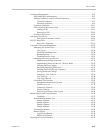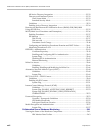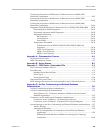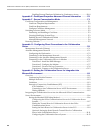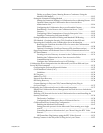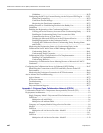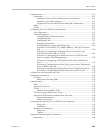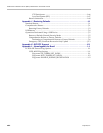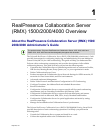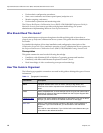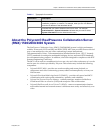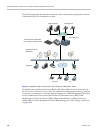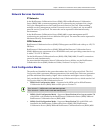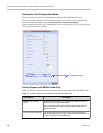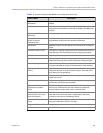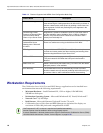
Polycom, Inc. 1-1
1
RealPresence Collaboration Server
(RMX) 1500/2000/4000 Overview
About the RealPresence Collaboration Server (RMX) 1500/
2000/4000 Administrator’s Guide
The Polycom® RealPresence Collaboration Server (RMX) 1500/2000/4000 Administrator’s Guide
provides instructions for configuring, deploying, and administering Polycom Multipoint
Control Units (MCUs) for video conferencing. This guide will help you understand the
Polycom video conferencing components, and provides descriptions of all available
conferencing features. This guide will help you perform the following tasks:
• Customize the Collaboration Server conferencing entities such as conference Profiles,
IVR Services, Meeting Rooms, Entry Queues, etc., to your organization’s needs.
• Define Collaboration Server Users.
• Further customize the Collaboration Server Network Settings for ISDN networks, IP
networks for Ultra Secure Mode, and IPv6 environments.
• Advanced conference Management
• Define Video Protocols and Resolution Configuration for CP Conferencing
• Configure Templates, the Address Book and schedule Reservations.
• Record Conferences
• Configure the Collaboration Server to support special call flows and conferencing
requirements, such as Cascading Conferences and Gateway Calls.
• Configure the Collaboration Server to support Polycom third party and partner
environments such as Microsoft, IBM, Cisco, Avaya, Broadsoft and Siemens.
• Configure the Collaboration Server for special applications and needs by setting
various system flags.
• Manage and troubleshoot the Collaboration Server’s performance.
The Polycom RealPresence Collaboration Server (RMX) 1500/2000/4000 Getting Started Guide
provides description of basic conferencing operations. It will help you perform the
following tasks:
• Unpack the Collaboration Server system and install it on a rack.
• Connect the required cables to the Collaboration Server.
The product names, Polycom
®
RealPresence
®
Collaboration Server 1500, 2000, 4000 and
RMX
®
1500, 2000, 4000 are used interchangeably throughout this document.



